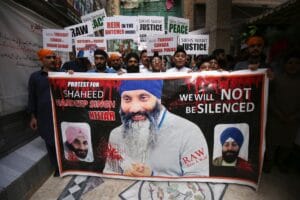Five main Conclusions on foreign meddling from Prime Minister Justin Trudeau’s testimony

During his testimony at the public inquiry into foreign interference on Wednesday, Prime Minister Justin Trudeau told the House of Commons about his knowledge of foreign attempts to influence Canadian politics and the circumstances surrounding his shocking allegation that India was responsible for the June 2023 murder of Hardeep Singh Nijjar.
The PM targets Conservatives
In a statement that drew harsh criticism from the Conservative Party, Trudeau claimed to have the names of Conservative lawmakers engaged in foreign meddling.
According to the prime minister, he also told the Canadian Security Intelligence Service (CSIS) to alert Pierre Poilievre, the leader of the Conservative Party, to safeguard the party’s reputation.
South Asian lawmakers prompted an investigation into the

The panel was told by Trudeau that although the shooting of Sikh activist Hardeep Singh Nijjar was initially deemed to be “gang-related or criminal-related,” South Asian others of Parliament and others of that community thought the Indian government was involved.
According to Trudeau, he challenged Modi during the summit.
Before India hosted the G20 last September, the prime minister claimed, his government chose not to publicize the claims of Nijjar’s death.
“How much do you know?” they asked us. Please provide the proof you have for this. “Well,” we said, “this is within your security agencies.” You ought to consider their level of expertise.
According to Trudeau, the media informed him about the Chong accusation.
During his hearing, Trudeau stated that he initially discovered through the media that the Chinese government was allegedly targeting Conservative MP Michael Chong.
Documents filed with the investigation show that during an in-camera hearing, Trudeau claimed to have deduced from media articles that China had decided to target Chong’s family to exert pressure on the Conservative MP.
China was asked to withdraw a diplomat by Canada.
Before choosing to label Zhao Wei “persona non grata” and expel him from the country, Trudeau told the investigation that Canada had requested that the Chinese government remove Zhao Wei, a Chinese diplomat who was accused of targeting Chong’s family.
What about Canadians who are Hindu? A lawmaker’s jab at Trudeau over the threat posed by Khalistan

Distinguished Indian-origin The threat posed by Khalistan extremism in Canada, which he claimed has been encouraged by political parties with vested interests, is something that Canadian MP Chandra Arya urged for more attention to address.
As the threat of Khalistani radicalism within its borders grows, the MP, who is a member of Trudeau’s Liberal Party, asked the government to take action. India has been pleading with Canada to take action against the Khalistani forces it harbors for a long time, but Ottawa has refused, claiming that they have the right to peaceful protest.
Additionally, the MP voiced concerns about the safety of Hindu Canadians, many of whom perceive the current spike in Khalistani activity as a threat. He disclosed that because of the disruptive protests by Khalistani demonstrators, he was compelled to attend a Hindu event in Edmonton while being guarded by police.
Arya urged Hindu Canadians to speak out and demand accountability from their lawmakers, saying, “Together, we must ensure that our safety and interests are protected.”
Chandra Arya, who has previously denounced attacks on Hindu temples purportedly carried out by pro-Khalistan individuals, has been a strong opponent of Khalistani fanaticism in Canada.
